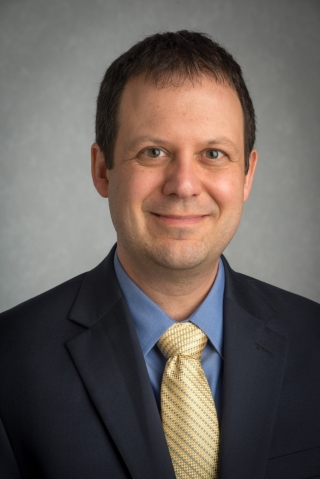 In deciding to join the faculty in WMed's Department of Biomedical Sciences, Erik D. Larson, PhD, said he was drawn in by the opportunity to contribute to a growing medical school that "fit with what I was looking for."
In deciding to join the faculty in WMed's Department of Biomedical Sciences, Erik D. Larson, PhD, said he was drawn in by the opportunity to contribute to a growing medical school that "fit with what I was looking for."
"I like the group," Dr. Larson said. "They are an integrated team that works together to get everything done."
Dr. Larson, 46, a native of Eugene, Oregon, joined the Department of Biomedical Sciences on April 10 as an Associate Professor for Molecular and Cellular Biology. He comes to WMed following a 10-year stint at the School of Biological Sciences at Illinois State University where he was an Assistant Professor and, later, an Associate Professor of Biochemistry and Molecular Biology.
At ISU, Dr. Larson also was director of the Biochemistry and Molecular Biology Degree Program from 2013 to 2014 and coordinator of the Molecular and Cellular Biology undergraduate and PhD degree programs from 2013 to 2017.
In his new role at WMed, Dr. Larson said he is excited to work directly with medical students and share with them his passion for molecular and cellular biology.
"The thing that draws me to teaching is the rewarding feeling I get when someone gains a new understanding of molecular biology," Dr. Larson said.
Dr. Larson completed his undergraduate studies at the University of Oregon in 1994 where he earned a bachelor's degree in Molecular Biology. During that same time, he did research at the university's Institute of Molecular Biology and spent his summers working as a biological technician for the USDA Forest Service, a job that gave him the opportunity to fight forest fires and conduct bird surveys.
In 1997, he earned a master's degree in Molecular Ecology from the University of North Dakota and followed that in 2001 with a PhD in molecular, cellular and developmental biology from Indiana University.
Dr. Larson said after obtaining his PhD, he headed back to the West coast where he spent the next six years as a senior fellow in the Department of Immunology at the University of Washington.
At ISU, Dr. Larson said his lab and the research conducted there focused on the mechanisms of genome instability and DNA repair. His biggest contributions, so far, he said, have centered around how DNA structures interfere with normal DNA metabolism to result in genome instability. Over the span of his career, Dr. Larson has been the recipient of several grants and his research has been published numerous times.
"It's a fundamental way that cells operate, and I love figuring out mechanisms underlying basic cellular functions," Dr. Larson said of his prior work in the field of genome biology.
Dr. Larson said molecular biology is an evolving field marked by many recent exciting developments, like rapid advances in genetic editing, including CRISPR-Cas9.
"The potential to edit genomes is the most exciting thing right now in Molecular Biology," Dr. Larson said. "It's an emerging technology that promises to have a pretty big footprint in medicine."
